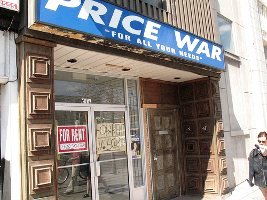Price War Among I-Cafés
 We live in a democratic country where the policy of free enterprise exists. What has this to do with the i-café business? Must free competition always lead to price war? Is it good for i-café owners? Can a win-win solution be found to resolve some serious issues on price war? These are questions that are always hot topics on favorite forums of i-café owners and as a former i-café owner, my concern about the issue of price war is on the same level as yours.
We live in a democratic country where the policy of free enterprise exists. What has this to do with the i-café business? Must free competition always lead to price war? Is it good for i-café owners? Can a win-win solution be found to resolve some serious issues on price war? These are questions that are always hot topics on favorite forums of i-café owners and as a former i-café owner, my concern about the issue of price war is on the same level as yours.
The issue is so serious that heated discussions among forumers result to name-calling ranging from “no-know” to “pest” as tags for i-café owners who start such price war. While the present scenario of cutthroat competition seems inevitable due to many factors like too many i-cafés for not so many customers and non-level playing fields in some areas, some shop owners are still hopeful that price cartel would solve the problem.
Nowadays, except for few underserved areas, the common cost of renting a computer in an i-café ranges from ten to fifteen (PhP10.00 -15.00) pesos only. This current price is about four (4x) times lower than when the industry started to grow about 8 to 10 years ago. While the price of computers has gone down by practically the same ratio, the cost of power and space rent did not. Most i-café owners believe that they barely break-even at computer rent of PhP15.00 per hour (US$0.30/hr) and the price war is killing the industry.
One major reason being cited as cause of the price war is the presence of colorum (no business permit) i-cafés. These shops can afford to lower their prices because the owners do not pay their taxes. While this may be true in a sense, I believe it is the oversupply scenario that really cause the prices to go down. The ease of setting-up and operating a i-café has caused it to be the business of choice not only now but for the past five years or so.
Many i-café owners think of forming an association for a certain area as a solution to price war. Many tried and succeeded forming an internet café association (ICA). Some ICAs even solicited the help of their local government units (LGUs) to empower the association to control i-café prices only to end up failing in their efforts to convince all members to charge the minimum price that they agreed among themselves. Prices always ended up lower than what they agreed on.
Price war in an industry is always an open-ended struggle. Many will lose and close shops but still many more will open and compete in the i-café business as long as it is thought to be a lucrative one. No amount of regulation can control the price of a commodity in a free society like ours. Only the law of demand and supply can govern it.




In my country associations doesn’t work that much, because members doesn’t get much profit, they think it’s not necessary to join the associations